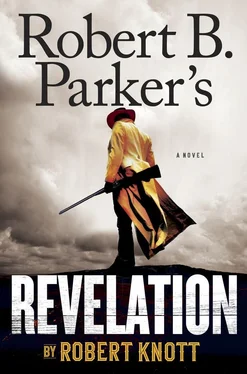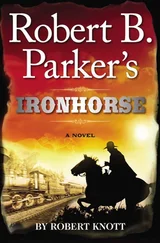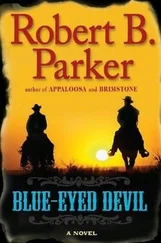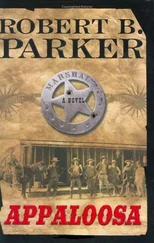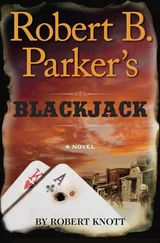Robert Knott, Robert B. Parker
Robert B. Parker's Revelation
Augustus Noble Driggs was lying inside the small stone room on a bunk, thinking about Jesus and whatnot. He was in the Tomb. That’s what the inmates called it. It was late in the evening and he was alone here, in the Tomb, in the odd April cold. He was watching gray vapors drift up from a small lantern beside his bunk that offered up rising battalions of ghostly dancers who twisted and swirled, then disappeared before they met the Tomb’s low rock ceiling.
The Tomb was solitary confinement, and the only reason Driggs was provided a lantern at all was so he could read the Bible that was left next to his bunk. It was the warden’s wife’s idea. She felt it a civic and moral duty — for those who could in fact read — to spread the Gospel.
The Tomb was in an isolated area separated from the main compound. This place, this penitentiary, was simply referred to by the inmates as Hell. It had another proper name when it was built, but that title was long ago forgotten and it was usually called Hell. Some referred to the massive stone structure as the Hell Hole or the Hot Box on the Hubs of Hell. The prison was meant to hold a maximum of two hundred and sixty prisoners, but it was currently overcrowded and brimming with close to three hundred. It was located in the desert — nearly one hundred miles from the closest town in every direction — and escaping Hell had proved to be near impossible. Driggs had considered escaping more then a few times but never found a way out that made any sense. Over the years a few had tried, but they all died in their attempts.
Normally this rock palace, Hell, was a sweltering-hot compound, a place where it was much easier to catch a heat-related disease than it was to catch a decent breath. But at times, when the temperature dropped, the prisoners would say, “Ol’ Sam pulled the goddamn lever.” Sam Satan, he was the operator, the true proprietor of Hell, and every so often he opened the gallows trapdoor that dropped in a strange, unseasonably glacial chill.
The prisoners would mostly die in the sweltering heat, of edema or syncope, of tetany, or stroke, or the galloping consumption, but the cold was also threatening. Since the place was constructed, through the consecutive hot summers and occasional cold winters, there had been more than a dozen men who couldn’t tolerate the conditions and took their own lives, usually by hanging from the bars at the end of a ripped blanket snugged around the neck.
Unlike thick-walled adobe structures that kept in the cool, this place was made from stone with walls built just thin enough to allow the outside temperatures to conveniently creep inside like an unwanted guest. Then there would be stretches of time in the winter when the chill would last for weeks, sometimes months.
The earliest inmates lived in tents, shackled by ball and chain as they erected the cavernous compound that overlooked a vast desert in every direction. And after a few years of hard labor, the prisoners moved into the very cells they had built, sealing their fate.
Set high up on a rocky bluff where the harsh sun and winter gales would insult and diminish the most capable, everyone — the guards, the administration, the warden, even the governor — understood that this place was in every way damnation and most certainly the work of the Devil himself.
The week previous it had been scorching hot, but this particular night in April was for some reason freezing, and the wind brought with it some uncommon moisture. Now, miserable wetness was added to the frigid April air. It traversed through the chambers and across the rock floor tunnels of the prison compound, making a bitter cold night even colder. But Driggs was okay with it. He knew this brief bit of unseasonably cold weather was just a passing snap.
Driggs was not good being on the inside, though. Being locked up in prison just did not suit him. He was not keen on authority, and as a result his insubordination kept landing him in confinement, in the Tomb. He didn’t mind it, really. In some ways Driggs preferred being in the Tomb to sharing a cell with others. Especially since the prison was overcrowded. At least this way, sequestered in the Tomb, he didn’t have to listen to ignorant conversations or tolerate stupid questions by the other prisoners, who were certain Driggs would know the answer to any and all.
No one really even knew Driggs. In fact, Driggs was not Driggs, not here on the inside. He was arrested, convicted, and incarcerated under the name Donnie Lonnigan. Through the years after the war, Driggs had assumed a number of names — aliases that kept him, as he preferred to be, a man unknown. From time to time throughout his past he was not above remaining in a place and blending in as a somewhat normal person among the masses, but for the most part he was a lone wolf.
Driggs was smart and everyone knew that about him. He was by no means the standard man found behind the walls of the institution. Most were common thieves, robbers of one kind or another. Some were rapists, some were on the inside for having too many wives, and some, like Driggs, were killers.
Driggs was different, though, and everyone knew it, they saw it and sensed it. Everyone looked up to Driggs. There was something about Driggs that average men did not possess. Other men felt safe with Driggs near. It was not that Driggs took up for them in any way, but it was the simple fact that he carried himself as if he meant something, as if he had a purpose, and that purpose gave the aimless others reasons to revere him. Everyone thought him mysterious — mythical, even. Some thought Driggs was an aberration, a ghost, but most felt he was in some way — though they had no real reason to believe this — their protector, their Savior, their Jesus. Not unlike Jesus, Driggs frightened the guards.
Even though they were the ones with the guns, Driggs unnerved them. It was his simple and still manner that intimidated them, his centered, relaxed frame; shoulders lowered, his long sinewy arms comfortably by his sides. And it was the way he walked. He moved unlike the normal man. He was more like a muscled Thoroughbred stallion. Not the poised ready-to-run type with ears back and head rising and falling. No. Driggs was calm and sure as he moved, always with his body squared, his hips and torso moving together, his head up high, supported by his long, muscly neck. His face was handsome and sturdy, and his hair was a shock of varying hardwood colors — blond, brown, and dark brown — that he wore at a medium length and combed back from his strong, browed forehead. He kept his keen blue-green eyes slightly hidden behind a squint that was more relaxed and natural than involuntary or intentional. His chin was square and his cheekbones were high. Driggs was the quiet type, too, answering annoying questions with a simple adjustment of his jawbone rather than words. He moved his tall, muscular frame effortlessly, as if he were not just a gallant steed but also a prescient, all-knowing predator. This unsettling power Driggs possessed prompted the warden to throw Driggs into the Tomb for simply being himself.
Driggs was educated, formally as well as self-taught. He was good with English, science, and math. He possessed skills far greater than his fellow students, but he also learned other needed abilities when he left the boring institutions and set out on his own. Eventually he ended up at West Point, but for many years previous he was a traveler, never staying in one place too long. Yet here, in this godforsaken place, he was going on close to four years. Driggs was a killer, no doubt about that, but he did his killing with precision. It started on the battlefield, that is where he got a taste for it, a bloodthirsty hankering. He was not just a good shot with a pistol or a long rifle, but he was also formidable in hand-to-hand combat. He learned his skills at the Point, where he graduated in the top in his class, but now he was here, living like a caged animal in the Devil’s Hot Box on the Very Hubs of Hell.
Читать дальше
